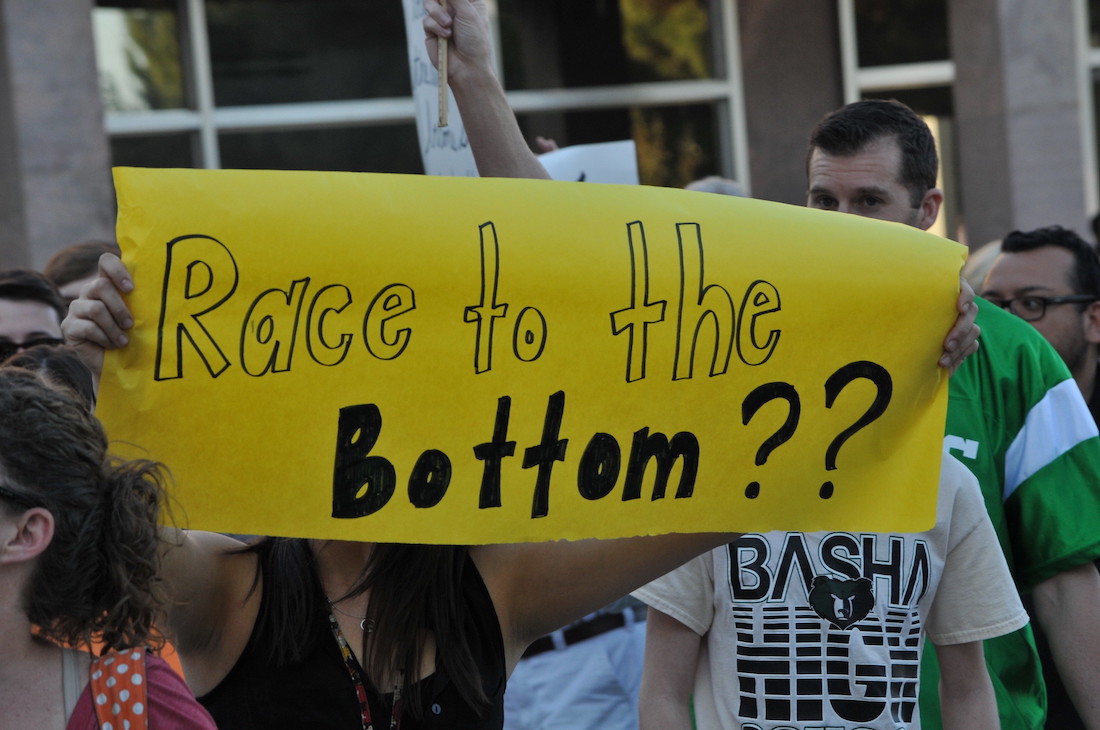The Biden administration proposes a global minimum tax on corporations to end the “global race to the bottom.” Leaving aside the wisdom of letting France tax U.S.-based corporations, this phrase recalls one of the regnant canards of our time: Capitalism inevitably lowers living standards and grinds people down into poverty.
The myth of the “race to the bottom” is among the multitudes of errors, distortions, and outright lies of the 1619 Project but has escaped notice, because so few recognize it as a fib.
Princeton sociology professor Matthew Desmond’s essay – “American Capitalism Is Brutal. You Can Trace That to the Plantation” – summarizes the standard argument well:
In a capitalist society that goes low, wages are depressed as businesses compete over the price, not the quality, of goods; so-called unskilled workers are typically incentivized through punishments, not promotions; inequality reigns and poverty spreads. In the United States, the richest 1 percent of Americans own 40 percent of the country’s wealth, while a larger share of working-age people (18-65) live in poverty than in any other nation belonging to the Organization for Economic Cooperation and Development (O.E.C.D.).
This is but one of many “errors of historical fact” and “misuse of historical sources” that Desmond should retract in this essay. But for our purposes, the key error is that, in a free-market economy, “businesses compete over the price, not the quality, of goods.” A brief reflection will show that the assertion is so erroneous that even Desmond does not believe it.
If Desmond truly believes that consumers only care about finding the lowest price, that raises a series of questions:
- When Desmond takes his wife, Tessa, out to eat, does he always take her to the cheapest restaurant – McDonald’s for her birthday, White Castle for their anniversary?
- When Desmond buys a gift for his mother, does he always purchase the least expensive jewelry – the worst-cut diamond?
- When Desmond is in the market for a new car, does he always purchase a used Yugo (the vehicle imported from Communist Yugoslavia that Car and Driver called “the worst car in history”)?
The answer to these questions, presumably, is no. Yet Desmond and others discard the reality of their “lived experience” to make the faith-based argument that all other Americans single-mindedly focus costs regardless of quality. It’s unclear where they get this notion: No survey of consumer debt would indicate that the American people are especially obsessed with saving money.
In real life, price is only one consideration for a consumer in any society. The buyer always wants to purchase the largest quantity of the highest-quality good at the lowest price. The seller wants to sell the lowest quantity of the least-expensive good at the highest price. In order to find the biggest market, producers compete with one another to find the most compelling niche. The market allows for both Aldi’s and Whole Foods, Hyundai and Mercedes, Great Value and Gucci. And marketing tests show that Americans are wary of buying anything that is priced too low precisely over concerns about its quality. There is no “race to the bottom,” because consumers are not heedless of their safety.
True, prices come down over time in the capitalist system. Marian Tupy of HumanProgress.org notes:
In 1968, for example, a 23” Admiral colour TV cost $2,544 or 125 hours of labour in the manufacturing sector. In 2018, a 24” Sceptre HD LED TV cost $99.99 or 4.7 hours of labour in the same sector (all prices are in 2018 US dollars). That’s a reduction of 96 per cent in terms of human effort.
The same could be said of microwaves, air conditioners, and everything from household appliances to luxuries. By contrast, the services that have caused Americans the most material pain over the last four decades are healthcare and education – those subject to the greatest government intervention, precisely the direction Desmond wishes to take all industries.
But what about quality? The 1968 Admiral TV’s cathode ray tube cannot compare with the picture quality produced by 2018 technology, much less warrant a price 25-times as high. I love my 5,000-record collection on vinyl as much as any collector, but it doesn’t sound better, last longer, or take up less room than a file of MP3s.
Free exchange benefits Americans by raising the purchasing power of workers’ wages. Economist Joseph Schumpeter described capitalism as “first and last an engine of mass production which unavoidably also means production for the masses.” Its main “achievement does not typically consist in providing more silk stockings for queens but in bringing them within reach of factory girls in return for steadily decreasing amounts of effort.”
That is, capitalism reduces cost through innovation, improvement, and abundance. New technologies don’t simply replace old ones; they sometimes subsume and combine them. Take, for instance, this photo comparing entertainment technology of the 1980s with today’s smartphone:
If anything, the picture understates the wondrous advancement of technological progress: The cell phone not only replaces pay phones and all the items pictured but also televisions, gaming systems, calendars, personal planners, photo albums, clocks and wristwatches, road maps, GPS units, rulers and tape measures, flashlights, compasses, notebooks, board games, pitch pipes, books, newspapers and magazines, filing cabinets, and snail mail. Few homes in the 1980s could afford all of these items, let alone for the price of a smartphone – which 85% of Americans now own (up from 35% in 2011).
These are curious status flags in the “race to the bottom.”
And Desmond misses the fact that individuals invented, improved, or replaced all of these products in the hope of making a profit in the marketplace through free exchange. Furthermore, they made our lives better even while misguided theorists falsely accused them of exploitation and despoilation somehow comparable to chattel slavery. As the Book of Proverbs says, “In all toil there is profit, but mere talk tends only to poverty” (14:23).
